Last updated 1 October 2020
DOUGLAS DOLPHIN IN AUSTRALIA
Compiled by Geoff Goodall
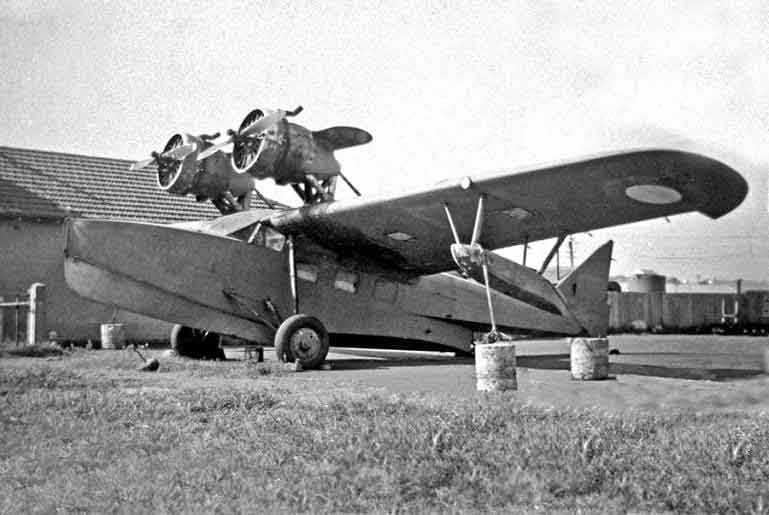
Former
RAAF
Dolphin A35-3 parked at Sydney Airport April 1949 after its
planned post-war civil career was abandoned.
Photo: John Hopton Collection
58 Douglas Dolphin amphibians were built between 1931 and 1934, mostly to US military orders for the US Navy, Coast Guard, Marines and Army Air Corps. Custom-built civil models were also offered as luxurious air yachts, or for airline services to islands off the US coast.
In Australia, during 1935 Guinea Airways had proposed purchasing two Dolphins and two Sikorsky S.38 amphibians to operate passenger and mail services within New Guinea and from Port Moresby to Cooktown on the northern Australian coastline, but nothing further came of the plan.
The first Dolphin seen in Australia was NC14286 (c/n 1282) imported by Australasian Petroleum Company for oil exploration survey work in New Guinea in conjunction with experienced US company Fairchild Aerial Surveys Corporation. It was shipped from USA to Brisbane, and flown to Port Moresby in January 1939, commencing a year long survey. Several press reports at the time indicated that APC used a second Dolphin on the New Guinea survey, but this is now believed to be incorrect, and in fact the second aircraft was a Fokker FVIIb-3M trimotor leased from KNILM and shipped to Port Moresby from Java in November 1938. 28,000 square miles were photographed and were the basis of maps for ground exploration that followed.
In the early days of World War II when the Royal Australian Air Force placed orders for large numbers of Consolidated PBY-5 Catalinas, the need for twin-engined seaplane training aircraft in Australia was recognised. The Seaplane Training Flight had been formed on 1st March 1940 at the newly constructed RAAF Station Rathmines on the shore of Lake Macquarie NSW, which was to be the RAAF's first dedicated seaplane base. Seaplane Training Flight commenced using RAAF Seagull V and Walrus amphibious biplanes, but these could not give the essential asymetric training in the air and on the water.
In May 1940 Australasian Petroleum Company donated their New Guinea survey Dolphin NC14286 to the Australian Government and was pressed into service by RAAF with Seaplane Training Flight at Rathmines as A35-1. It proved effective in the training role, and more Dolphins were requested.
The Australian Production Commission had been established under the wartime Ministry of Munitions, to source a range of military equipment at home and overseas. Mr. F. B. Clapp, the Australian Government Trade Commissioner in New York, working in conjunction with the British Purchasing Commission (Australian Division) was instructed to locate more Dolphins. Acquiring second-hand civil aircraft was an unusual task, most aircraft purchased for RAAF being new production aircraft delivered from their manufacturers. However there was recent experience, purchasing ten ex-Eastern Airlines Douglas DC-2s for the RAAF through the experienced US aircraft brokers Charles H. Babb Company.
The following cables give an indication of the efforts made to purchase more Dolphins:
- 17 January 1941 Clapp to APC, Melbourne: "We have under offer five used Douglas Dolphin amphibian aircraft. Wasp Junior 300 hp. Condition reported good. £25,000 each plus boxing and freight. Advise immediately if interested."
- 22 January 1941 Dept of Air to Clapp: enquiring about spare parts. Want a spare engine and prop per aircraft
- 27 January 1941 Clapp to Dept of Air: spares are available but airframe parts are limited
- 7 February 1941 Letter from British Purchasing Commission (Australian Division) to the APC in Australia confirms Charles H. Babb Co has 5 Dolphins available and recommends these aircraft as eminently suitable for transitional training and auxiliary uses. Encloses details on two of the five Dolphins, NC982Y & NC14205. The letter concludes with "Mr. Babb is a very reliable person to deal with for this type of equipment."
- 28 February 1941 APC to Clapp: "Purchase best three of the five second-hand Douglas Dolphin amphibian machines as quoted at $25,000 each or better price. Also three spare Wasp Junior engines and propellers and a range of spares to be selected by you. Endeavour procure any special overhaul tools for airframe and engine and makers' spare parts lists and maintenance date."
- 14 March 1941 Clapp to APC: "Two Dolphin will not pass inspection. Third in excellent condition: have option to purchase. Remaining two at present operating from California. Available May 1st and Boehm will inspect within a few days."
- 21 March 1941 APC to Clapp: "Will take one, two or three provided that specified range of spares is available."
- 4 April 1941 Clapp to APC: cabled that three Dolphins will be shipped to 2AD Richmond and spares to 2 Stores Depot at Waterloo NSW. However the situation changed abruptly a month later.
- 29 April 1941 Clapp to APC: "..position now clarified regarding aircraft but for your information the three available Dolphins will have different engines. First Pratt Whitney Wasp C.1, second Wright 276E, third Pratt Whitney Wasp Junior. Can obtain spare engine and spare propeller for each aircraft. Propose ordering through Lend-Lease but before doing so desire urgent confirmation in view of different engines each amphibian."
- 9 May 1941 Clapp to Dept of Air: "US Government confiscated the (obliterated) which were to replace the two Dolphins running to Catalina Island. As a result can not obtain them. In order to avoid losing third aircraft am placing order on a cash basis this machine with spare Pratt & Whitney 450hp SB Junior engine and propeller also necessary engine spares and limited range of airframe spares. Hope to ship about May 20"
- 12 May 1941 Acting Consul General, New York to Dept of Air, Canberra: "Douglas Dolphin has been shipped."
- 3 June 1941 APC to Clapp: "Douglas Dolphin aircraft. Request state whether there is any possibility of obtaining two more aircraft in the future"
- 10 July 1941: Clapp to APC: "Procuring second Douglas Dolphin Lend Lease 19,500 dollars. Will advise delivery later. No further Dolphins available."
- 15 November 1941: Department of Air file summarising current RAAF aircraft orders: "Dolphin: 3 on order - one delivered and advice just received indicates that another one will be shipped in November. It seems unlikely that we will receive the third one."
Over the next year, two more Dolphins were shipped from USA, giving the RAAF a total of four Dolphins A35-1 to A35-4. They were used for seaplane training at Rathmines, as well as communications with No.9 (Fleet Requirements) Squadron at Rathmines and one had a brief attachment to No.4 Communications Flight at Archerfield. Throughout their service, RAAF experienced great difficulty in the supply of spare parts for the Dolphins. An indication of this difficulty is given in a June 1943 instruction to No.15 Repair & Salvage Unit. 15RSU was allotted the wrecked P&W Wasp powered Ford Trimotor A45-1 (formerly VH-UBI, impressed from Guinea Airways) which had overturned at Myola Lake, New Guinea while evacuating wounded troops. RAAF HQ agreed to the Ford being written off "subject to any parts that can be salvaged and brought out of Myola landing ground being salvaged. Desire stress necessity for salvaging serviceable or slightly damaged engines as spares for Dolphin aircraft."
Only one Dolphin, A35-3, survived RAAF wartime service. An early enquiry on 20 September 1944 from the newly formed Commonwealth Disposals Commission requested the Department of Air to supply details of aircraft likely to be released for disposal. The initial cautious response quoted just one DH.90 Dragonfly and one Douglas Dolphin were available. "The Dolphin was bought overseas, just being overhauled, 8-9 passengers. Might suit petroleum company".
It was sold for £550 to a former RAAF pilot who had high hopes of establishing a coastal seaplane service. But the Department of Civil Aviation refused to certify the aircraft for commercial passenger operations because of its extremely poor performance on one engine. A35-3 was allocated civil registration VH-AGE but the DCA restrictions resulted in this last Australian Dolphin being abandoned at Sydney Airport, still wearing its RAAF camouflage.
The four RAAF Dolphins A35-1 to A35-4 are listed in order of serial number:
C/n 1282 Douglas Dolphin 136 Essowing NC14286, A35-1
| .34 | Built by Douglas Aircraft Company at Clover Field, Santa Monica, California |
| Built to the order of Standard Oil Company of New Jersey, specifying 450hp P&W Wasp Junior SB engines | |
| .34 | Registered NC14286 Standard
Oil Co of New Jersey. Named Essowing |
| Operated as an executive transport, named Essowing (the
phonetic for S.O. for Standard Oil was Esso which became
the company's marketing name). It was shipped to Venezuala for a period to assist the company's search for oil. |
|
| .38 | Transferred to newly formed Australasian Petroleum Company Pty Ltd, an associate company of Standard Oil Co. APC was founded 16.10.38 as a joint venture between Vacuum oil Co, Anglo-Iranian Oil Co and Oil Search Ltd |
| .38 | Export to Australia handled by Charles H. Babb Company, Glendale Air Terminal, California |
| .38 | Shipped from USA to Australia on board M.V.Eknaven |
| 1.1.39 | NC14286 arrived Brisbane on board M.V.Eknaven |
| 1.39 | Moved by road to Archerfield Aerodrome where assembled and test flown |
| 1.39 | Departed Archerfield for Port Moresby, flown by pilot Fred E. Secor, and Chief Engineer J. R. Lund and photographer Morgan Reynolds. All were Americans with extensive experience in aerial survey. The survey camera weighs 112lb and each spool of film is 200 feet long. |
| 8.1.39 | Flew Cairns-Cooktown in bad weather, during which it landed at the mouth of the Daintree River en route for an hour. Departed Cooktown next morning but forced to return due weather. |
| Commenced a large scale exploration and aerial photographic mapping survey of Papua New Guinea in the search for oil deposits. A KNILM Fokker trimotor was also used and there are reports of a second Dolphin but these are believed to be erroneous. | |
| 28.9.39 | Sydney Customs ledger: NC14286 arrived Mascot Aerodrome, Sydney at 9.20am from port Moresby via Cooktown. Captain F. E. Secor, operator Australasian Petroleum Co |
| 5.40 | Donated to Australian Government by Australasian Petroleum Co Ltd. |
| 27.5.40 | Minister for Air (Mr. J. V. Fairbairn) announced that a Dolphin had been presented to the Australian Government by Australasian Petroleum Co Pty Ltd. He said the Government greatly appreciated the spirit that prompted the company's actions. The aircraft would probably be allotted to the seaplane base at Rathmines for training. |
| 7.6.40 | Official US Civil Register change of ownership date to Australasian Petroleum Company Pty Ltd |
| 17.6.40 | Taken on RAAF charge as A35-1. Pratt & Whitney engines No's 2038 & 2679 installed, plus spare engine No.3539. RAAF Status Card states: "late America NC14286" |
| 17.6.40 | RAAF Status card: Received at Seaplane Training Flight, Rathmines ex APC serviceable. |
| 6.40 | 9 Squadron, Rathmines history states the Dolphin was received in June 1940 |
| 8.40 | Sydney Morning Herald newspaper 26.8.40 has photograph taken at Rathmines of a Dolphin in dark camouflage and 9 Squadron code letter "J" on nose. Serial no visible but must be A35-1. |
| 15.9.40 | RAAF Status card: Serviceable at No.9 Squadron,
Rathmines. (Status Card does not record the earlier allocation to 9 Sqn from STF) |
| 22.9.40 | U/S at 9 Sqn. Undercarriage roller bearings to be renewed. Parts available in 5 days |
| 21.10.40 | Serviceable at 9 Sqn |
| 5.12.40 | A35-1 flew Rathmines-Newcastle, pilot Wg Cmdr J.A. S. Brown RAF, who was CO of 9 Squadron. Smoke sighted out to sea, located floating wreckage with 13 men from SS Nimben which had struck a mine dropped by the German raider Pinguin along the NSW coastline and south to Bass Strait. The crew of the Dolphin guided SS Bellembi to pick up the survivors. |
| 1.5.41 |
Pilot log book: A35-1 flew Rathmines to Rose Bay, pilot Wing Commander W.H. (“Bull”) Garing |
| 5.6.41 | Allotted Seaplane Training Flight, Rathmines ex 9 Sqn |
| 7.6.41 | Serviceable at STF |
| 6.7.41 | Pilot log entry: A35-1: dual instruction at Seaplane Training Flight, Rathmines |
| 19.7.41 | Pilot log entry: A35-1 local flying Rathmines |
| 9.8.41 | Pilot log entry: A35-1 flown Rathmines to Rose Bay, Sydney by Sqn Ldr D. A. Connelly |
| 6.9.41 | Allotted Station Workshops, Rathmines for complete overhaul. |
| 4.1.43 | Completion of overhaul indefinite |
| 15.7.43 | Overhaul not completed. Approval for conversion to components |
| Components used to rebuild A35-3 |

Australasian Petroleum’s NC14286 in New Guinea 1939. Photo APC via Dave Eyre
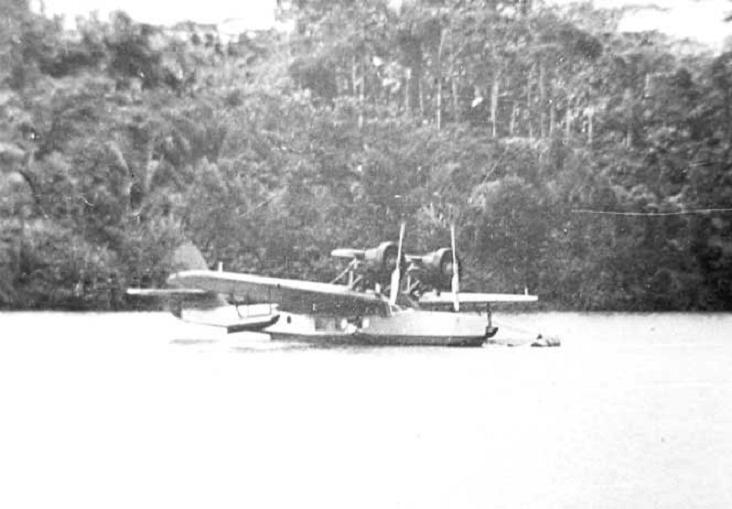
NC14286 on a river in New Guinea 1939. Photo APC via Dave Eyre
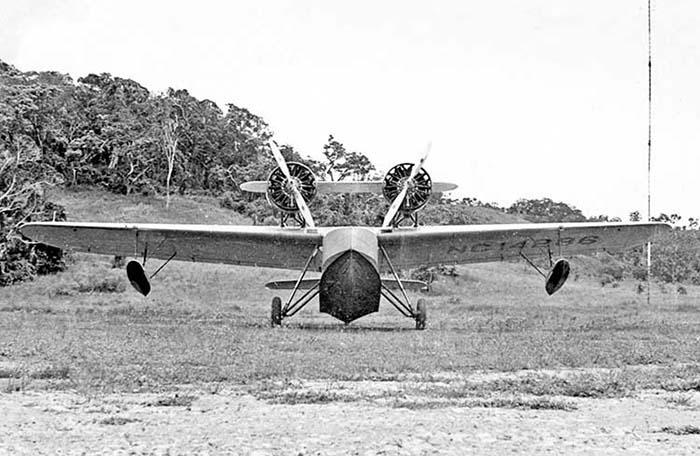
NC14286 in New Guinea 1939
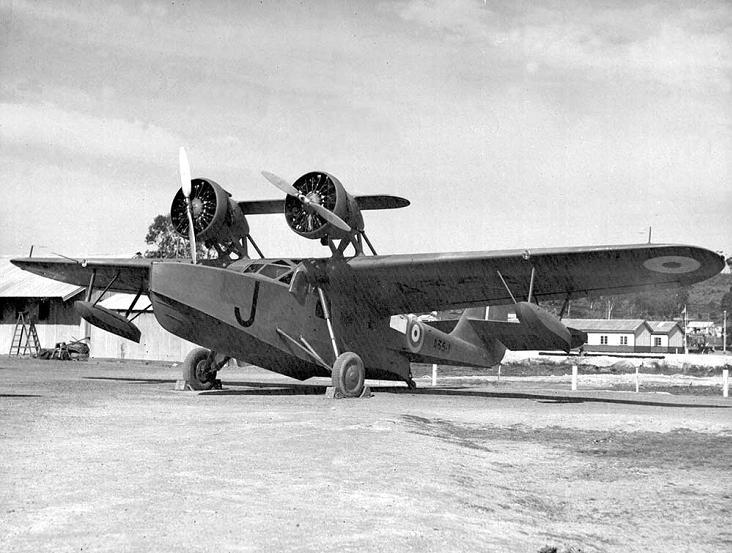
A35-1 with 9 Squadron, coded “J” at Rathmines. Photo: RAAF Museum
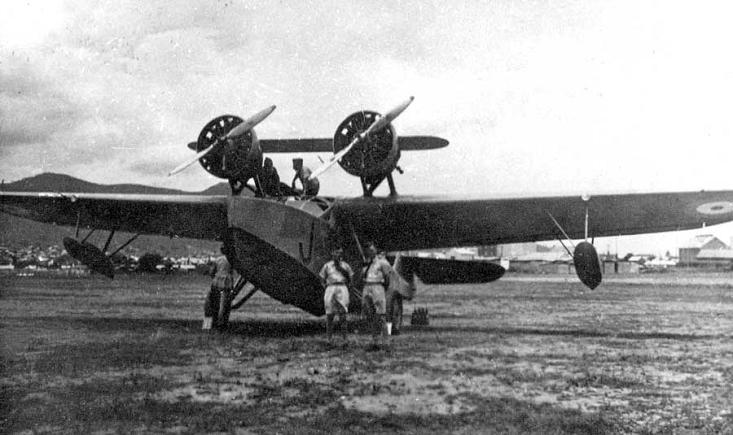
A35-1 "J" visiting Tamworth NSW. Photo: Geoff Goodall collection
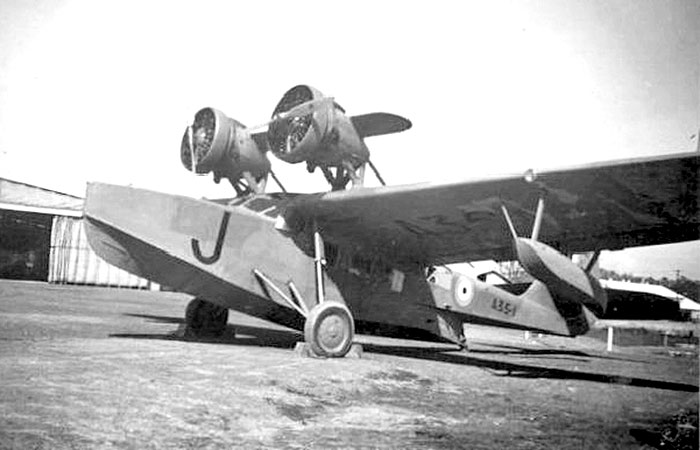

A35-1 code "J" enters the waters of Lake Macquarie from a slipway at RAAF Rathmines.
C/n 1002 Douglas Dolphin Model 1 , Model 1 Special NC12212, A35-2
| 31 | Built by Douglas Aircraft Company at Clover Field,
Santa Monica, California This was the fifth Dolphin constructed |
| Built to the order of chewing gum company millionaire William Wrigley,
specifying 300hp Wright J-5C Whirlwind engines. Fitted for 2 pilots and 6 passengers on the airline service to Santa Catalina Island resort, owned by Wrigley. Referred to at the Douglas factory as the Wrigley Number Two. Designated Dolphin Model 1 |
|
| .32 | Registered NC12212 Wilmington Catalina Airline Ltd, Wilmington California |
| Operated the 26 miles airline service from Wilmington in the Los Angeles harbour area to Avalon on Catalina Island, with a fleet of five Dolphins. The airline built its own airport on the island with a sloping ramp into the sea, a turntable to rotate the aircraft for departure down the ramp, and a passenger terminal building. | |
| Later redesignated Dolphin Model 1 Special when modified to seat 10 passengers | |
| Re-engined with P&W Wasp SC1 | |
| 41 | Continued on the Catalina Island airline service until 1941 |
| 6.41 | Shipped from USA to Australia after purchase by Australian Government Trade Commissioner in New York, who sent cable 19.6.41 advising it had been shipped. Unconfirmed this aircraft |
| 25.8.41 | Taken on RAAF charge, received from USA. Two P&W Wasp SC1 engines No's 255 & 256 |
| 25.8.41 | Awaiting erection at RAAF Richmond ex USA |
| 20.9.41 | Serviceable at Seaplane Training Flight, Rathmines |
| 8.10.41 | Mainplane badly damaged in ground-loop during landing. Accident report does not give details, but probably occurred on the short land runway at Rathmines |
| 11.10.41 | Unserviceable indefinite at STF Workshops |
| 13.1.42 | Serviceable at Station HQ, Rathmines |
| 2.3.42 | Received No.9 Squadron, Rathmines ex HQ Rathmines. Squadron code "YQ-Z" |
| 27.7.42 | Forced landing on water Fullerton Cove NSW after both engines failed
at 3,000 feet. Fullerton Cove is on the north arm of the Hunter River
between Newcastle and Williamtown. Aircraft returned on auxiliary tanks |
| 13.10.42 | Received Rathmines Workshops ex 9 Sqn |
| 1.43 | No.9 Squadron moved base from Rathmines to Bowen Qld |
| 12.4.43 | Issued No.3 Operational Training Unit, Rathmines |
| 23.6.43 | Two plates badly corroded. Repair beyond capacity of 3OTU |
| 24.6.43 | Received No.2 Flying Boat Repair Depot, Rathmines ex 3OTU for repairs to hull |
| 1.7.43 | Received 3OTU Rathmines ex 2FBRD |
| 20.7.43 | Received No.9 Squadron, Bowen Qld ex 3OTU |
| 9.43 |
9 Sqn ORB: A35-2 flew from Bowen to Cairns and return |
| 12.12.43 | Received No.2 Flying Boat Repair Depot, Rathmines ex 9 Sqn for overhaul. |
| 24.1.44 | Overhaul not completed. Corrosion and other maintenance problems considered beyond economical repair. Recommend conversion to components |
| 14.2.44 | Approval for conversion to components |
| 44 | Components used to rebuild A35-3 |
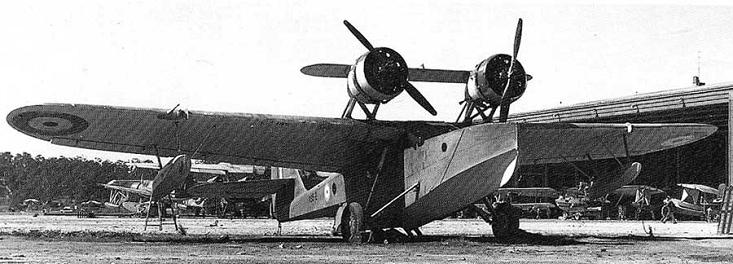
A35-2 at Rathmines in original camouflage and RAAF roundel. Photo: David Vincent collection

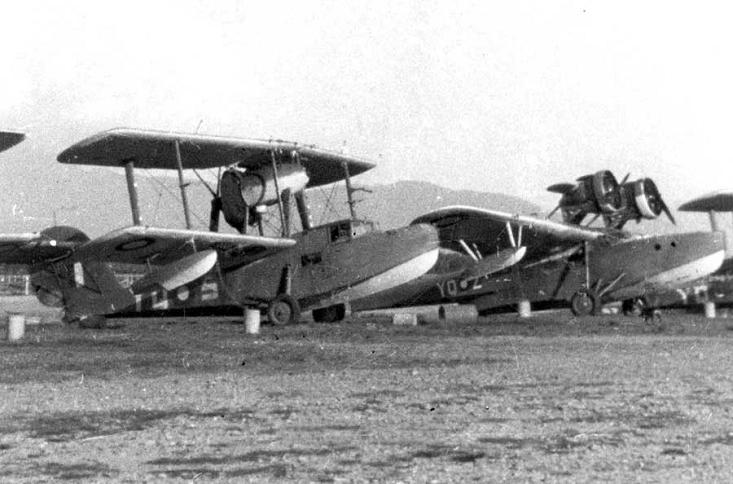
Dolphin A35-2 with
Pacific theatre blue/white roundel and 9 Squadron code "YQ-Z",
at Trinity Inlet, Cairns, Qld in 1943, parked
with 9 Squadron Walrus "YQ-S".
Photo: David Vincent collection
C/n 1001 Douglas Dolphin Model 3 NC982Y, A35-3, (VH-AGE)
| 6.31 | Built by Douglas Aircraft Company at Clover Field, Santa Monica, California. This was the fourth Dolphin built |
| Built to the order of US industrialist Powell Crosley Jr, specifying
seating for 2 pilots and a delux air yacht cabin with seating for
4 passengers. Engines 300hp P&W R-985 Wasp Junior A |
|
| .31 | Registered NC982Y Powell Crosley / Crosley Radio Company, Named Lesgo |
| 29.6.31 | CAA issued Approved Type Certificate to NC982Y as a Dolphin 3 |
| 11.31 | Delivered ex Douglas |
| Operated with wheel spats fitted to the main retractable undercarriage wheels | |
| 6.38 | Major overhaul by Pratt & Whitney |
| Modified to Dolphin Model 1 Special | |
| 1.41 | NC982Y was included in a group of 5 Dolphins offered by US aircraft dealer Charles H. Babb Co, Grand Central Air Terminal, Glendale California to the Australian Government Trade Commissioner in New York: "Wasp Junior 300 hp. Condition reported good. $25,000 each plus boxing and freight." |
| 2.41 | Details listed by Australian Government Trade Commissioner in New
York: NC982Y Built June 1931, airframe time 1500 hours, Civil licence expires 1 November 1941. Red hull and cream wings. P&W R-985AWasp Juniors. Had been submerged in water in 1931 but rebuilt at Douglas factory. Purchased by Crosley who sold it to the current owner. |
| Shipped to Australia | |
| 5.10.42 | Taken on RAAF charge at 1SFTS Point Cook, "received ex Royal
Air Force". (see note below) Two P&W Wasp SC1 engines, No's 17 & 69. (1SFTS at Point Cook formed a section in June 1942 to undertake erection of aircraft for RAAF shipped from overseas, primarily Ansons and Oxfords, also 12 Kingfisher floatplanes.) |
| 5.10.42 | Erection commenced at RAAF Point Cook |
| 6.10.42 | RAAF Status Card: "On underside of mainplane NC982Y" |
| 19.10.42 | Unserviceable indefinitely, awaiting spare parts |
| 9.11.42 | Erection completed at Point Cook |
| 17.11.42 | First test flight at Point Cook |
| 20.11.42 | Departed Point Cook on delivery to Rathmines, accompanied by RAAF Walrus X9520 |
| 21.11.42 | Received No.9 Squadron, Rathmines ex Point Cook |
| 11.1.43 | Received Station HQ, Rathmines ex 9 Sqn |
| 20.1.43 | Received No.3 Operational Training Unit, Rathmines ex SHQ Rathmines |
| 25.1.43 | Received Station HQ, Rathmines ex 3OTU |
| 22.3.43 | Received 3OTU Rathmines ex SHQ Rathmines |
| 43/44 | A35-3 rebuilt at Rathmines using parts of A35-1 & A35-2. It
was a major rebuilding task which took 8 months and was commended
by Donald Douglas after WWII. H. N. Berrick wrote to RAAF News November 1964: "I was the NCO (airframe) in charge of the rebuilding of A35-3 from the components of A35-1 and A35-2: job which took some eight months to carry out. We used the hull of A35-3, which was almost complete rebuilt, the mainplane of A35-1 and undercarriage, hydraulic system and cockpit controls from A35-2. A new pair of floats were made and the reconditioned motors were from A35-1." Considerable modifications were necessary as the three aircraft were all different in their layout, cabin fitment, hydraulic systems, engines and tailplane assembly. |
| 17.10.44 | Last overhaul in RAAF service |
| 6.12.44 | Last flight in RAAF service. |
| 13.12.44 | RAAF Survey Report prepared for Commonwealth Disposals Commission by Wing Commander G.R.Thurston, CO of 3OTU Rathmines.: P&W Wasp Junior SB1 serviceable, aircraft condition is good, unserviceable brakes limit it to water operations only. Total hours flown in RAAF service 145:25 hours: "All previous history of the aircraft before RAAF acceptance is unknown. Airframe log books make no reference to previous hours flown. This aircraft being the only one of its type in RAAF it is most uneconomical from both the service and maintenance point of view because replacement parts are impossible to procure." |
| 1.45 | A35-3 was included in the first tender issued by the CDC with a closing date for bids of 20 February 1945. |
| 29.3.45 | RAAF Status Card: Aircraft has been sold by Commonwealth Disposals
Commission to Mr. Whittle for £550. On receipt of monies, 3OTU to issue aircraft to purchaser on application. |
| 1.5.45 | Stuart F. Doyle, Managing Director of Newcastle
Safety Airways wrote to DCA on a letterhead "Stuart Doyle Enterprises, Sydney, Melbourne, Adelaide, London and New York": his company Newcastle Safety Airways plans to use the Dolphin on a scheduled daily service from Sydney to Newcastle, landing at coastal towns en route as a water operation. Delivery of the Dolphin is being taken this week. |
| 3.5.45 | RAAF Status Card: A35-3 issued to Mr. Whittle ex 3OTU Rathmines |
| 4.5.45 | DCA file memo: A35-3 was purchased in April at Rathmines by Mr. M. Whittle, a former RAAF pilot. Purchase price £750 (sic). It will be based at Mascot and registration VH-AGE has been allotted |
| 5.5.45 | A35-3 Logbooks sent to DCA by RAAF Rathmines |
| 5.45 | Ferried Rathmines to Sydney Airport |
| 24.5.45 | VH-AGE DCA file: decided that the Dolphin will not be granted a
CofA for passenger operations due to its unsatisfactory performance
on one engine. Pre-war performance figures on the type quote "Single
Engine Ceiling: water level". Department writes to Newcastle Safety Airways advising them of the decision and suggesting that flight performance tests may allow a reduced All up Weight to be applied to a CofA for cargo operations. |
| As a result of the refusal to grant a CofA for passenger use, Newcastle Safety Airways cancelled their arrangements with Mr. M. Whittle | |
| 13.6.45 | M. Whittle advises DCA that he plans to ferry VH-AGE to Essendon Airport, Melbourne. |
| 6.7.45 | M. Whittle wrote to DCA: confirms that the arrangements with Newcastle
Safety Airways to charter the Dolphin from him have been cancelled.
He asks DCA to assist him to make Commonwealth Disposals Commission
take the aircraft back and refund all his costs and threatens legal
action. "The aircraft has now become a liability to me. I
consider I have been exploited." An internal DCA review of Whittle's complaint was sympathetic. DCA wrote to CDC suggesting that they take the Dolphin back and have it scrapped. Minutes of a CDC meeting held on 10.9.45 include "It was decided to defer actions pending the re-sale of the Douglas Dolphin by Mr. Whittle." |
| 10.7.45 | E. J. Connellan of Connellan Airways, Alice Springs NT cabled DCA:
"Are Wasp Juniors of Dolphin
recently sold by Disposals Commission suitable for Beech 17 and
later Beech 18s? Understand Dolphin may be resold shortly. Connellan."
DCA replied to Connellan saying the engines would be suitable although
some internal parts may need to be changed |
| 13.7.45 | DCA file memos: Whittle is attempting to sell the Dolphin. A possible buyer is in Queensland who wishes to carry passengers between Gladstone and Heron Island |
| 4.8.45 | Sidney D. Marshall t/a Marshall Airways, Mascot Airport, Sydney advises DCA's Sydney office that he wishes to purchase the Dolphin VH-AGE. He was requesting permission to test fly it first and required a petrol ration for the test flights. |
| 5.8.45 | DCA Head Office replies to Sydney office: refuses permission for fuel ration."It is highly improbable that this aircraft will be granted a Certificate of Airworthiness" |
| 8.8.45 | DCA Sydney office cables Head Office in Melbourne: "Marshall has purchased Dolphin
VH-AGE. What action now please?"
|
| 5.9.45 | Sid Marshall writes to DCA Head Office on a letterhead Marshall Airways, Mascot Aerodrome, Sydney: he wishes to commence work immediately on an overhaul for CofA for the Dolphin. He understands that it can not be used for airline purposes. He intends to use the Dolphin for pleasure flights, freight and private flying, not airline work. |
| 9.45 | DCA file memos indicate that the Department are still very concerned
about the aircraft's poor performance on one engine. However
there was consideration of Sid Marshall's wartime ambulance flying
and his maintenance of RAAF aircraft with the minimum of resources. Decision taken to reply to Marshall that a CofA would be considered for freight and private flying only, subject to satisfactory flight performance tests carrying varying loads of freight. |
| DCA nominated the dates of 3rd & 4th October 1945 for flight tests of the Dolphin at Sydney. Departmental personnel attending for the Dolphin tests would also flight test Adastra Aerial Surveys Avro Anson VH-AGG at the same time. | |
| 16.10.45 | DCA file memo: Discussions with Mr. Marshall had come to the conclusion
"that no useful purpose would be served by flight testing
the aircraft". Internal memos discuss the belief that Marshall's only plans for the Dolphin are joyriding but the single engine performance was unsatisfactory for passenger carriage. Memo states: "If we grant Marshall a Private CofA he will side-step the regulations and use it for joyriding." |
| 14.5.46 | Sydney Morning Herald newspaper report: a seaplane landed
yesterday on Botany Bay, flown by its owner Sidney D. Marshall, then
flew to Cooks River where the aircraft taxied on to the beach for
the night. Another test landing was to be the following day. Compiler's note: these locations are adjacent to Sydney Airport (Mascot) so it appears Marshall was making test flights in the Dolphin within the circuit area of the airport. RAAF disposals Catalinas were being converted to civil on the Cooks River at that time. |
| c46 | Withdrawn from service, parked at Sydney Airport |
| 4.49 | A35-3 noted at Mascot Airport, parked next to a building. Still in faded RAAF camouflage with Pacific theatre roundels. Engines attached, but control surfaces removed |
| 17.7.49 | Sydney Sunday Herald newspaper report: Australia's only
Dolphin amphibian is parked at Mascot outside the Marshall Airways
hangar. It is owned by a Sydney syndicate and operated by Marshall
Airways but has not moved from its present position in many months.
Mr. Sid Marshall said "It was hoped to run an aerial ferry service
with her after she left the R.A.A.F.," he said. "We also
thought it might be possible to run a charter service to places that
needed an amphibious aircraft. But somehow these plans did not materialise." "The old lady has a splendid flying record," he remarked. "She can land at 50 miles an hour and has no vices when operating on land or water." An agent for a proposed trawling expedition said recently that his firm was considering buying the plane to spot shoals of fish out at sea. The plane could be equipped with radio, he said, so that the pilot could guide the trawlers to the best fishing grounds. It could also act as a weather ship to warn the fishing boats of the approach of bad weather. |
| c49 | The Dolphin was seriously considered for a new seaplane venture
in New Zealand by W. Hewett and H.J. Cartres. However a sale was not
finalised In 1947 Bill Hewett founded Southern Scenic Airtrips in Queenstown NZ with Proctors and Austers. He wanted to establish an amphibian service between Invercargill and Stewart Island and also to Fiordland. His initial announcements circa 1949 stated he would use a Douglas Dolphin which was in Australia but his operation never commenced. An Invercargill amphibian service was later to be established in 1951 when a new company Amphibian Airways Ltd commenced Grumman Widgeon services to Stewart Island. |
| 11.49 | Registration VH-AGE re-allocated by DCA to CAC Wackett Trainer A3-138 for ANA Flying Club. Essendon Vic. |
| Notes: - The 5.10.42 notation on the RAAF Status Card "Received from: Royal Air Force" is assumed to refer to its purchase through the British Purchasing Commission in USA, or simply a clerical error due to the many cards being raised at that time for large numbers of ex RAF Avro Ansons sent to RAAF: the RAF did not operate Dolphins; - RAAF status card has a note "Aircraft is Model 8-1143 P.C.A.M" |
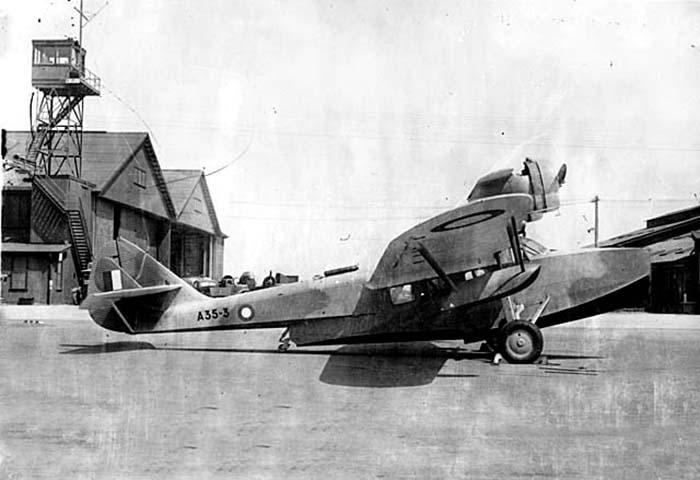
A35-3 in service at an unidentified RAAF station. Photo via Steve Mackenzie
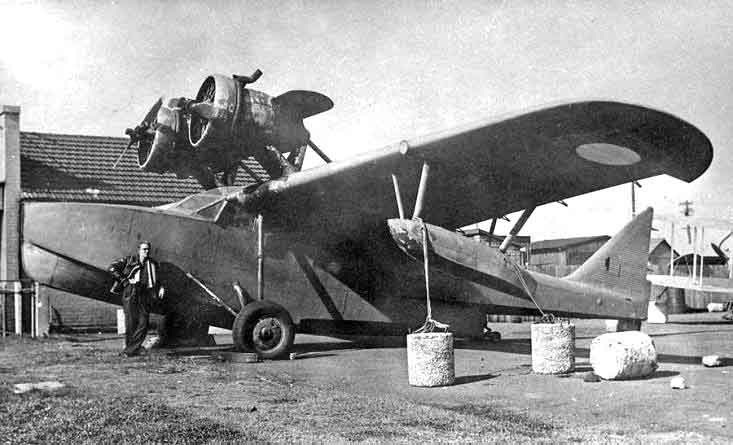
A35-3/VH-AGE
retired at Mascot circa 1948 with control surfaces
removed.
John Hopton Collection
C/n 1279 Douglas Dolphin 8, Dolphin 114 NC14204, A35-4
| .34 | Built by Douglas Aircraft Company at Clover Field,
Santa Monica, California After building only military Dolphins for two years, in 1934 Douglas offered improved custom-built Dolphins for the civil or export market, powered by P&W Wasp engines |
| Ordered by William Wrigley, chewing gum millionaire and owner of Santa Catalina resort island off Los Angeles, who specified 450hp Wasp SC1 engines. Referred to at the Douglas factory as the Wrigley Number Five. | |
| .34 | Registered NC14204 Philip K. Wrigley |
| Operated by Wrigley's Wilmington-Catalina Airline Ltd | |
| Modified to Dolphin Model 114, which was certificated for up to 11 passengers. | |
| Operated the 26 miles airline service from Wilmington in the Los Angeles harbour area to Avalon on Catalina Island, with a fleet of five Dolphins. The airline built its own airport on the island with a sloping ramp into the sea, a turntable to rotate the aircraft for departure down the ramp, and a passenger terminal building. | |
| .40 | Change of company name: Catalina Air Transport, Long Beach California |
| 6.41 | Photo at Catalina Island, in passenger service, "Catalina Air Transport" titles |
| 11.42 | 1SFTS Operations Record Book indicates by vague entries that a second Dolphin was assembled by 1SFTS Point Cook (1SFTS assembled A35-3 the previous month) |
| 12.3.43 | 1SFTS Operations Record Book records the arrival of an unidentified Dolphin at Point Cook from Williamstown (Melbourne suburb on Port Philip Bay) |
| 8.4.43 | Taken on RAAF charge as A35-4, received from USA. Two P&W Wasp SC1 engines |
| 8.4.43 | Received No.1 Service Flying Training School,
Point Cook ex USA. (1SFTS at Point Cook formed a section in June 1942 to undertake erection of aircraft for RAAF shipped from overseas, primarily Ansons and Oxfords, also 12 Kingfisher floatplanes.) |
| 8.4.43 | To be camouflaged |
| 19.4.43 | Serviceable at 1SFTS |
| 5.43 | 1SFTS Operations Record Book makes mention of an unidentified Dolphin making a flight of an hour's duration during May |
| 22.5.43 | Received No.3 Operational Training Unit, Rathmines ex 1SFTS |
| 8.7.43 | Issued to No.4 Communications Flight, Archerfield ex 3OTU |
| 10.7.43 | 4CF Operations Record Book: A35-4 dual sea landings |
| 13.7.43 | 4CF Operations Record Book: A35-4 dual sea landings |
| 16.7.43 | 4CF Operations Record Book: A35-4 dual sea landings |
| 28.7.43 | 4CF Operations Record Book: A35-4 dual sea landings |
| 29.7.43 | 4CF Operations Record Book: first travel flight with A35-4: Departed Archerfield at 12.20pm for Rose Bay, Sydney. Crew Sqn Ldr Wood and F.O. Forbes, carrying passengers Air Commodore Summers and Flt Lt. Ebeling. |
| 29.7.43 | Crashed Rose Bay flying boat base, Sydney Harbour. Following a water takeoff at Rose Bay, hydraulic failure resulted in main wheels dropping down and due to lack of pressure they could not be locked down or retracted. Pilot Sqn Ldr Wood of 4CF made an emergency water landing at Rose Bay at 4.45pm, during which the aircraft overturned. Badly damaged, no injuries. |
| 30.7.43 | Aircraft being handed over to servicing party for transport to No.2 Flying Boat Repair Depot, Rathmines |
| 2.8.43 | Allotted 2FBRD Rathmines for inspection and damage report. 2FBRD to arrange transport from Rose Bay |
| 8.8.44 | Approval for conversion to components |

NC14024 at Santa Catalina
Island off California with Wilmington Catalina Airlines. The Dolphin is
parked on the airline's
Hamilton Cove base turntable,
which was used to rotate aircraft to face the slipway for departure back to the mainland.
Tailpiece....
The last airworthy Douglas Dolphin in the world was N26K, photographed by Barney Deatrick at the San Rafael Sky Harbor floatplane base near San Francisco in September 1962.
It was built in June 1934 as NC14205 as an air yacht for retired Boeing founder William E. Boeing, who named it Rover. Interestingly this Dolphin was included with the original five Dolphins offered to RAAF by US aircraft broker Charles H. Babb Company in 1941. At that time it was listed as having logged only 780 hours, all flown for the same owner by the same pilot. Its most recent overhaul had been carried out in December 1937 by Pacific Airmotive at Burbank, California. It could be assumed to have been in excellent condition, yet for reasons not explained it was not acquired and only one of those five offered Dolphins was shipped to Australia.
N26K flew into the 1990s owned by an American aircraft enthusiast and is now displayed at the National Naval Aviation Museum at Pensacola Florida, painted as US Coast Guard military RD-4.

References:
Based on research by fellow Australian historians Dave Eyre, Trevor Boughton, David Vincent and John Hopton.
- RAAF Status Cards A35-1 to A35-4, RAAF Historical Section, Department of Air, Canberra
- RAAF Status Card Ford Trimotor A45-1, RAAF Historical Section, Department of Air, Canberra
- RAAF Operations Record Books, 1SFTS and SHQ Point Cook, RAAF Historical Section, Canberra
- DCA aircraft file VH-AGE: National Archives of Australia, Melbourne, Series MP113/1 #334531
- RAAF accident report A35-4: National Archives of Australia, Series A9845 #6590597
- RAAF aircraft - Disposal of - Policy, Dept of Air file, National Archives of Australia, MP855
- Chronology of Events and Formation dates of No.9 Squadron, Dept of Air, Canberra
- Douglas Dolphin Aicraft - Enquiries in USA, National Archives of Australia, MP287/1, File 865, #645147
- The Aeroplane in Australia series, Douglas Dolphin, John Hopton, last amendment 22 August 2001
- National Library of Australia - Trove newspaper archive website
- McDonnell Douglas Aircraft since 1920, Rene J. Francillon, Putnam, London 1979
- United States Navy Aircraft since 1911, Gordon Swanborough & Peter M. Bowers, Putnam, London 1976
- Flypast - A Record of Aviation in Australia, N.M. Parnell & T.W. Boughton, CAA 1988
- Wings of Gold - How the Aeroplane Developed New Guinea. Jame Sinclair, Pacific Publications 1978
- Australian Air Force since 1911, N.M.Parnell & C.A.Lynch, A.H. & A.W.Reed, Sydney 1976
- Units of the Royal Australian Air Force - A Concise History, RAAF Historical Section, AGPS 1995
- The Douglas Dolphin in RAAF service, Geoff Goodall & David Eyre, Aviation Heritage Vol 25 No.1,
Journal of Aviation Historical Society of Australia
- The Douglas Dolphin, Peter M. Bowers, Airpower magazine, November 1982
- RAAF News newspaper series: RAAF aircraft types series: A35- Douglas Dolphin, Keith Isaacs
- RAAF News November 1964: letter from H.N.Berrick regarding rebuild of A35-3 at Rathmines
- National Library of Australia, newspaper search site: http://trove.nla.gov.au/ndp/del/home
- ADF Serials site: www.adf-serials.com
- Wilmington Catalina Airline site: http://catalinagoose.homestead.com/wilmingtoncatalina.html
- Douglas aircraft in RAAF, listings compiled by Alan Bovelt
- Aeroplane magazine 21 April 1950: report on planned NZ use of a Dolphin:
- Air Britain Archive magazine 1996: pages 96/29 & 96/54: re planned NZ use
- Kangaroo Kingfishers, David Vincent, Air Enthusiast magazine No.77, September/October 1998